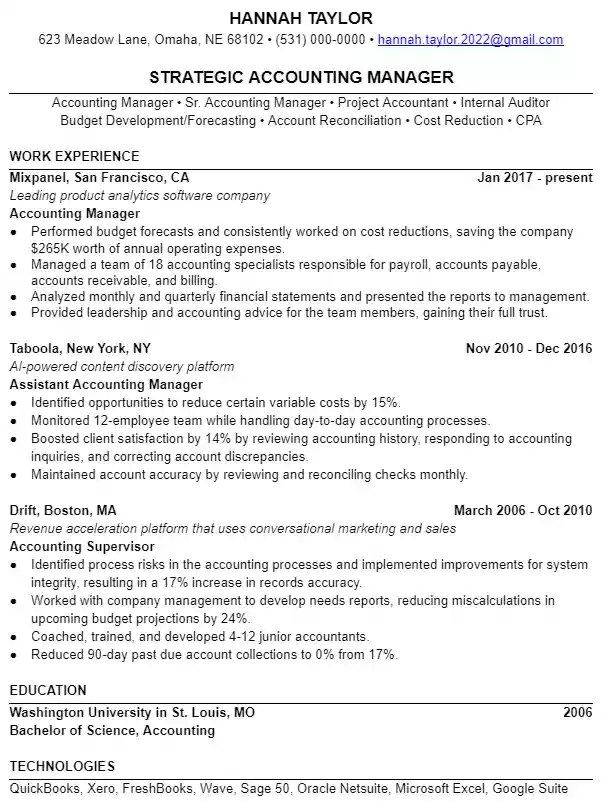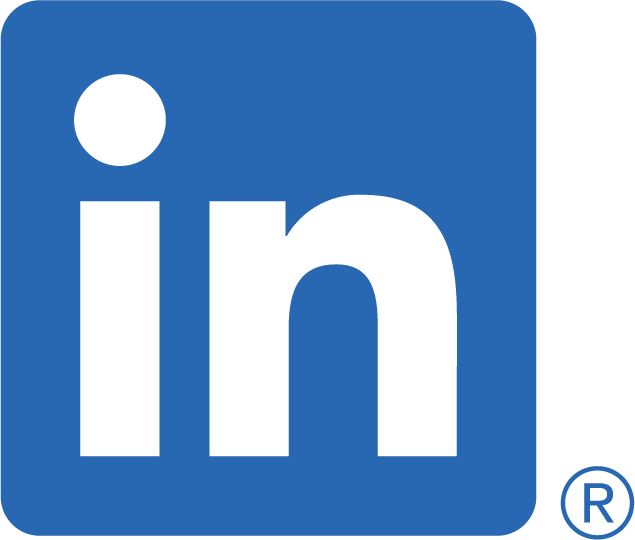Accounting Resume Example
Learn how to write a great accounting resume by following our bulletproof resume writing guide. Need help writing your resume? Hire Leet Resumes to write it for you free of charge.


How to write a great accounting resume
You know where every dollar that flows in or out of your business goes.
You keep the books so well organized that the IRS is practically calling you to help them through an audit.
But when it comes to explaining your accounting prowess on your resume, you’re a little stumped.
Hey, that’s completely normal. It’s ok to have a difficult time writing your resume.
We want to help you out. That’s why we commissioned our resume writers to create this comprehensive sample accounting resume template. Take a look at it below!
Do you want to know why this template is so effective? It’s because it follows our proven formula for crafting a winning resume.
We’re ready to share this winning resume formula with you, today.
Read on to learn how you can write your great accounting resume here!
Do I have to write my resume on my own?
Even with a foolproof writing guide, writing your own resume can be a real challenge.
Luckily, there is an easier option. You can hire Leet Resumes to write your accounting resume for free – tips are appreciated!
There are no strings attached. We know that the resume is the critical component of your job search – the document that gets you interviews and ultimately job offers.
And we’re ready to write yours for free. Click here to get started.
How to format an accounting resume
Do you want to know my favorite recruiting stat?
Every job opening gets 118 applications.
That means that your odds of getting any given job are less than 1%.
That’s not to scare you. That’s just to show you that you need to figure out a way to increase that percentage.
Here’s another fact. 23 of those 118 (on average), get a phone interview.
That’s just about 20%.
Getting into this 20% is critical. Once you can get to a phone screen, you can advocate for yourself and explain why your experience makes you a great fit for the company.
But before that phone screen, the only document you have advocating for you is your resume.
This is why you need to format your resume as effectively as possible. A well-formatted resume gets your foot in the door, and helps you move through the interview process.
Here are some things to avoid.
Avoid using any odd fonts like cursive or (heaven forbid) wingdings. Stick to standard fonts like Arial or Times New Roman.
Avoid having weird formatting. No text boxes, no images, no multiple columns.
Why do you avoid this? Because your resume is first read by a computer. It’s parsed by an ATS (applicant tracking software) that sorts out your experience, your education, and your skills. It then will assign your resume a score that lets your recruiter know if your resume is worth reading.
And you want a recruiter to read that resume.
Here’s the format you’ll use:
- Name + Contact
- Professional Headline
- Professional Summary
- Work Experience
- Education
- Keywords
Let’s take a look at each of these in a little more detail.
Name + Contact
It may seem obvious, but you have to put your name and your contact information at the top of your resume.
Otherwise, your recruiter won’t know who you are and how to get ahold of you.
For contact info, make sure you put your phone number and your email address. Email addresses should be professional sounding – up to 70% of recruiters say that they’d consider not moving forward with a candidate because of an unprofessional email address.
You can add your LinkedIn profile if you’re active on the site, but just be aware that it adds another channel of communication, i.e. another way for a recruiter’s message to get lost in the shuffle.
Professional Headline
It’s time for the professional headline. Think of it as the title you’ve fashioned for yourself as a job seeker.
You’ll want to cover your job title, your seniority, and your work style in 3-5 words.
Here’s a quick sample for you: Diligent Accounting Professional.
This works well because it shows off your work style, as well as your industry.
And you can have that headline for free! You’re welcome!
Professional Summary
The professional summary bridges the distance between your professional headline (short and sweet) and your work experience (extensive).
This section functions as your elevator pitch. It’s that 30-second, 2-4 line blurb that gives the recruiter a good sense of your accounting skills and your achievements.
Curious as to how to format this? Look no further! Job titles you’re seeking Accounting experience you have Accounting accomplishments Accounting promotions and awards
Lines 1 and 2 are mandatory. These show the recruiter that there is alignment between the job you’re seeking and the job they’re hiring for.
Lines 3 and 4 are optional, depending upon your experience. If you’re a junior accountant, you may not have as many promotions as, say, a controller. That’s ok. Stick to lines 1 and 2 in that case.
Having trouble writing your accounting resume? Let us write it for you!
We’ve written thousands of resumes, and we are ready to write yours for free – tips appreciated.
Reach out to get started today!
Work Experience
This is the focal point of your resume. The previous sections have served to let the recruiter know you’re a good fit for the job, but this section proves that you’re worth interviewing.
It’s, in our opinion, the most important part of your accounting resume.
To get that recruiter to set up an interview, structure your experience around these five key concepts.
Focus on successes, accomplishments, and achievements
As an accountant, you may be tempted to focus on your daily tasks, such as filing invoices, handling accounts payable and receivable, and things of that nature.
You shouldn’t do that.
Instead, you should focus on your big wins. You need to brag about all of the big projects you’ve completed.
Talk about that departmental audit you completed. Highlight that imposing accounting project.
This will impress a recruiter. They’ll see that hiring you leads to results. And that’ll make them want to interview you.
Use strong verbs
Keep the recruiter’s attention on your resume by starting a bullet with a verb: audited, compiled, rectified, analyzed.
Actions keep the focus on your work, which helps the recruiter envision you in the role they’re hiring for.
Quantify your experience
I don’t mean to say, “I worked here for three years.” I mean, say, “Audited 15-strong sales team by examining 3,000 invoices, resulting in 30% savings.”
Ok, yes, I am not an accountant. I get that it doesn’t quite work like that. But you get the picture. You can see that second example is way stronger because it specifies the impact you had at your organization.
Add the numbers to specify your work impact.
Call out your promotions
If you’ve been promoted on the job, you’ll want to make a note of it. This helps construct the narrative arc of your career, and shows a recruiter that you can learn and grow on the job.
Recruiters are always looking for surefire bets – candidates that will benefit the company. Promotions mean that companies do not have to agonize over an external hiring process. Seeing a promotion on your resume signifies that they could hire you for theoretical positions in the future.
Always include dates
Every job should include dates. I know that, for many reasons, it may be tempting to avoid putting dates.
Perhaps you took some time off to raise a family. Perhaps you got laid off. Perhaps you got let go.
These things happen and they are valid.
A recruiter wants to understand the arc of your accounting career. When there are gaps in your resume, they’ll naturally be curious, but they won’t discriminate against a gap without a conversation first.
Don’t be worried, just put the dates and trust that your recruiter will respect your work history.
Education
This section is much easier and much shorter than the last one. All you’ll need to do is add any degrees and certificates you’ve received that are relevant to your work as an accountant.
Don’t forget to include the name of the institution as well as the program you completed.
Keywords
The last section on your accounting resume is almost as critical as your work experience. It’s your keywords section, where you list any hard skills, soft skills, and awards that are relevant to your employment as an accounting professional.
Here are some hard and soft skills that you should consider adding to your resume:
- ERP
- SAP
- Oracle
- Data Analysis
- SQL
- Quickbooks
- Microsoft Visual Basic
- Attention to detail
- Communication
- Conflict Resolution
The skills section is likely the last section your recruiter or hiring manager will read, so it’s important to list all of your relevant skills to convince them that you can do the job!
And that’s it! That’s all there is to writing a great accounting resume.
Not so hard, right?
Can I get someone to write my accounting resume for me?
Still struggling to write that perfect resume?
Give Leet Resumes a shot. We will write you a personalized accounting resume for free (tips are appreciated).
You have nothing to lose and a whole career to gain.










